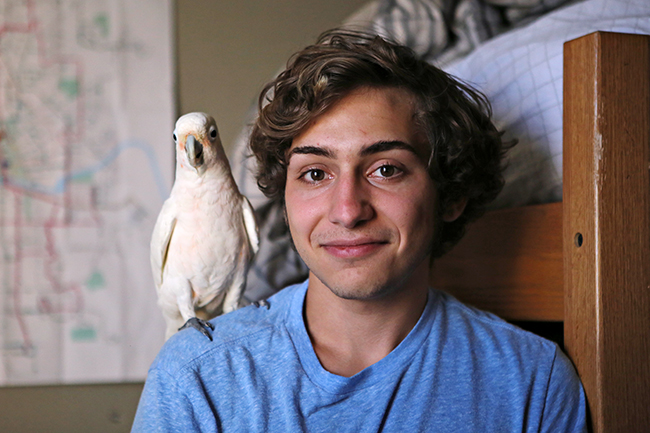While most incoming students spent their summer buying shower caddies and deciding which posters to bring to their dorm, one freshman was going through the process of bringing his emotional support animal — a cockatoo — to campus.
Biology freshman Brady Lee, who lives in Jester West and said his emotional support cockatoo, Alpine — or Al for short — is therapeutic to his social anxiety and depression.
“She gives me someone to come back to everyday,” Lee said. “She is a very tactile animal — cockatoos are — which means that she likes to cuddle, so that’s really good for comfort in general so that’s basically what I do with her. I’ll come home and I’ll play with her and I’ll cuddle her and it’s like a stress reliever.”
A cockatoo is one of many animals allowed on campus for students who may require comfort or service animals for support. While service animals are specifically trained animals that help those with disabilities, emotional support animals can be any type of animal deemed necessary to afford a person with a disability any comfort they may need, according to Emily Shryock, assistant director of Services for Students with Disabilities.
According to Shryock, there are currently eight students approved to have emotional support animals for fall of 2015, and that number is increasing every year.
“I think that people are starting to recognize that it’s an accommodation for disabilities, and it is something that they can request, contributing to the increased number that we are seeing,” Shryock said.
According to the Americans with Disabilities Act, public entities must provide accommodations for those with disabilities, which can sometimes include emotional support animals. They are not protected by the same laws that apply to service animals.
In order to receive approval for an emotional support animal, students must request a housing accommodation and provide supporting documentation of their disability, Shryock said. Shryock said the student must have a disability, and there must be a connection between the person’s disability and the therapy the animal provides in order for an animal to be considered emotional support.
“A lot of people will say, well my dog makes me happier or less stressed, and, if you’re a dog person, that’s probably true for everyone,” Shryock said. “What we’re looking at is does this person have a disability and how does it impact their functioning, what is the animal’s role in helping to manage that disability.”
Environmental science freshman Julianne Dewar said she almost decided to sneak her rabbit into her dorm last year and wishes UT allowed more students to bring their pets to campus.
“After a hard day you want to pet something fuzzy, and you’re not allowed to which sucks,” Dewar said. “I don’t know if its a top priority, but I think I would like to see a change with UT’s rules on [pets.]”
Although he is happy to have Al living with him in Jester West now, Lee said it took him a few months to research about UT’s emotional support animal policy and wishes there were more resources for students to learn about their options.
“It’s not widely known at all that you can have support animals, and I feel like its really beneficial for people with symptoms with anxiety and depression,” Lee said. “As long as they can help themselves by going to counseling, I feel like then there should be no problem allowing emotional support animals to continue that treatment.”





















